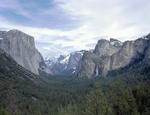Study of Black Bears Finds It’s Not the Mamas That Should Be Feared the Most
By PAM BELLUCK
Published: May 11, 2011
If you believe Stephen Colbert — and really, who doesn’t? — bears are deadly. “Bears are soulless, godless, rampaging killing machines,” the comedian has written. “They are Satan’s minions and the TRUE symbol of evil.” He might be surprised, then, by a new study that found that black bears — the most common bears in North America — have killed only 63 people in the United States and Canada over the last 109 years.
The study also found, contrary to popular perception, that the black bears most likely to kill are not mothers protecting cubs. Most attacks, 88 percent, involved a bear on the prowl, likely hunting for food. And most of those predators, 92 percent, were male.
“Mother bears, whenever they feel threatened or a person is too close, they act very aggressively,” said Stephen Herrero, the study’s lead author. “They make noise, they swat the ground with their paws and they run at people. They want to make you think that they’ll eat you alive, but they almost always stop.” By contrast, “the kind of bear you need to be afraid of is not feeling threatened by you — it’s testing you out as a possible prey item,” said Dr. Herrero, a professor emeritus at the University of Calgary. “It’s quiet. It stalks you just like a lion might stalk you.”
... The black bear findings, published Wednesday in the Journal of Wildlife Management, suggest that people should behave differently around different bears. With a mother defending cubs, “you just back away calmly and give it some space,” Dr. Herrero said. “With a predatory bear, you stand your ground, stomp at it, throw rocks at it, whatever you need to do to convince it you’re not easy prey.”
Never run from bears, and always discourage them with bear spray, portable electric fencing and bear-resistant food containers, Mr. Morgan said. He stressed, though, that “any two bears you meet are as different as any two people you meet. Not every person you come across is a calm poet, not every person is a nasty mugger. Bears, because of their intelligence, develop individual personalities.”
http://www.nytimes.com/2011/05/11/science/11bears.html?_r=1&hpw
Home
>
General Discussion
>
Topic
Re: Black bear study in Journal of Wildlife Management
All posts are those of the individual authors and the owner
of this site does not endorse them. Content should be considered opinion
and not fact until verified independently.
|
Black bear study in Journal of Wildlife Management May 11, 2011 07:47PM | Registered: 16 years ago Posts: 571 |
May 11, 2011 08:06PM | Moderator Registered: 16 years ago Posts: 1,876 |
Quote
KenS
Study of Black Bears Finds It’s Not the Mamas That Should Be Feared the Most
By PAM BELLUCK
Published: May 11, 2011
“Mother bears, whenever they feel threatened or a person is too close, they act very aggressively,” said Stephen Herrero, the study’s lead author. “They make noise, they swat the ground with their paws and they run at people. They want to make you think that they’ll eat you alive, but they almost always stop.” By contrast, “the kind of bear you need to be afraid of is not feeling threatened by you — it’s testing you out as a possible prey item,” said Dr. Herrero, a professor emeritus at the University of Calgary. “It’s quiet. It stalks you just like a lion might stalk you.”
... The black bear findings, published Wednesday in the Journal of Wildlife Management, suggest that people should behave differently around different bears. With a mother defending cubs, “you just back away calmly and give it some space,” Dr. Herrero said. “With a predatory bear, you stand your ground, stomp at it, throw rocks at it, whatever you need to do to convince it you’re not easy prey.”
Never run from bears, and always discourage them with bear spray, portable electric fencing and bear-resistant food containers, Mr. Morgan said. He stressed, though, that “any two bears you meet are as different as any two people you meet. Not every person you come across is a calm poet, not every person is a nasty mugger. Bears, because of their intelligence, develop individual personalities.”
http://www.nytimes.com/2011/05/11/science/11bears.html?_r=1&hpw
Stephen Herrero is also the author of this classic book on bear attacks (first published in 1985, revised edition appeared in 2002):
http://www.ske-art.com/qspur/158574557X
Edited 1 time(s). Last edit at 05/11/2011 08:09PM by szalkowski.
Sorry, only registered users may post in this forum.


